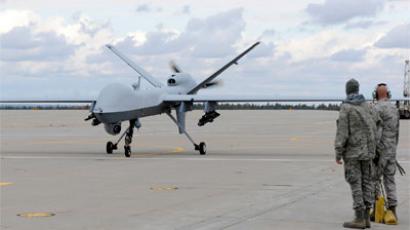White House admits it can't kill Americans with drones in US

Two leading figures within the Obama administration now insist that the president of the United States does not have the authority to launch drone strikes on US soil.
Sen. Rand Paul (R-Kentucky) received a response from the Obama administration on Thursday afternoon after spending 13 hours demanding answers about the possible use of drones inside of the United States.
During a briefing Thursday afternoon, White House press secretary Jay Carney said, "The president has not and would not use drone strikes against American citizens on American soil.”
Mr. Carney also elected to read a statement penned by Attorney General Eric Holder earlier that day that had been sent to Sen. Paul. Mr. Holder’s entire statement, only 43 words, confirmed Mr. Carney’s remark.
“It has come to my attention that you have now asked an additional question: ‘Does the President have the authority to use a weaponized drone to kill an American not engaged in combat on American soil?’ The answer to that question is no,” wrote the attorney general.
The official response came one day after Sen. Paul stood up on the floor of the Capitol Building in Washington and said he would filibuster the nomination hearing for US President Barack Obama’s choice for the next CIA director, John Brennan, until he was presented with answers about the administration’s past and planned use of drones both overseas and domestically. Days earlier, Holder told the senator, “It is possible, I suppose, to imagine an extraordinary circumstance in which it would be necessary and appropriate under the Constitution and applicable laws of the United States for the President to authorize the military to use lethal force within the territory of the United States.” Into the evening and eventually Thursday morning, Sen. Paul continued with his presentation, occasionally being joined by members of both sides of the aisle to demand answers about the drone program.
“I will speak until I can no longer speak. I will speak as long as it takes, until the alarm is sounded from coast to coast that our Constitution is important, that your rights to trial by jury are precious, that no American should be killed by a drone on American soil without first being charged with a crime, without first being found to be guilty by a court,” Paul said during part of the roughly 13-hour filibuster.
After receiving word of the remarks from both the White House and Justice Department, Sen. Paul was asked if he was satisfied with their response. “Yes,” Sen. Paul told CNN, adding that he would allow for the Senate to continue confirming Mr. Brennan since he felt he won his fight: the right for every American of due process.
The remarks from both the attorney general and official administration spokesperson came shortly after a reconvened US Senate continued weighing in on the nomination of Mr. Brennan earlier in the day. During the filibuster, Sen. Paul and his colleagues raised questions about the government’s drone program and the possible overstepping of authority from around the world, earning headlines and praise by even fair-weather followers of American politics. Right on cue, however, establishment politicians of both the Democratic and Republican parties responded by dismissing Sen. Paul’s claims as not relevant to either major groups, smearing his statements much the way the politics of his father, former-Rep. Ron Paul (R-Texas), often left him portrayed as a representative “on the fringe.”

The senator from Kentucky finally finished his coup Thursday morning at 1 a.m., and the Senate retired for the evening before reconvening to continue with the confirmation nearly one day to the minute after Sen. Paul first spoke up. Among the first order of business, to some lawmakers, was responding to the problems with the drone program raised during the filibuster.
Shortly after Thursday morning’s matters got off the ground, Sen. John McCain took the floor to condemn his colleague’s claims from earlier that day, reading in part from an op-ed published hours earlier by the Wall Street Journal.
"If Mr. Paul wants to be taken seriously, he needs to do more than pull political stunts that fire up impressionable libertarian kids,” read Sen. McCain.
John Stanton, the DC bureau chief for Buzzfeed.com, tweeted from Washington, “So while much of the GOP establishment scrambled last night to be seen with @SenRandPaul, McCain is clearly not one of them.”
"I don't think what happened yesterday is helpful to the American people,” continued McCain, who added at one point that Sen. Paul did a "disservice to a lot of Americans for making them fear they're in danger from their government."
“They’re not,” added McCain. "That brings the conversation from a serious discussion of us policy to the realm of ridiculous.”
Shortly after McCain began his assault, Sen. Lindsey Graham (R-South Carolina) joined him on the floor in order to continue picking apart Sen. Paul’s remarks from the filibuster. Although the marathon diatribe began Wednesday morning during a confirmation hearing for Mr. Brennan, Sen. Paul’s testimony quickly turned into an attack on the Obama administration’s drone program, where Brennan has served as a counterterrorism adviser. By proxy, then, Sen. Paul is using the nomination of Brennan to bring the drone discussion further in the forefront. Even opponents on the same side of the aisle saw a problem with this approach, though, and on Thursday Sen. Graham said he was offended by his cohort’s demands.
“He says he wants this president to tell him that he won’t use a drone to kill an American citizen sitting in a café having a cup of coffee who is not a combatant,” Sen. Graham said of Paul’s demands. “I find the question offensive.”
Sen. Graham went on to say that such discussion “cheapens the debate,” and that while the president of the United States does and should have the authority to use military action in the event of a national emergency, no American should ever fear of being attacked by a drone.
Just days earlier, though, the Obama administration informed Sen. Paul that, indeed, a US citizen could be struck with a drone strike anywhere in America without ever being brought to court.
“It is possible, I suppose, to imagine an extraordinary circumstance in which it would be necessary and appropriate under the Constitution and applicable laws of the United States for the President to authorize the military to use lethal force within the territory of the United States,” Attorney General Eric Holder wrote Sen. Paul earlier that week.
Following the administration’s admission, Sen. Paul has demanded a more forthright response from the president. During the filibuster, he made repeated demands for a direct answer from Pres. Obama, and at one point said, “I can’t understand the president’s unwillingness to say he’s not going to kill noncombatants. Think about that. He’s unwilling to say publicly that he’s not going to kill noncombatants.”
Responding to his remarks, Sen. Graham said Thursday, “I hope all of us would agree using military force” in a situation that put the US in danger — even if it involved an American citizen on US soil — “is not only lawful under the Authorization to Use Military Force” but “within the inherent authority” of the commander-in-chief.
“The question is, do you feel threatened anymore? I do. I think al-Qaeda is alive and well,” said Graham. The senator from South Carolina continued on dismiss Sen. Paul’s claims by rejecting his worries about an American citizen being blown up by a drone while enjoying lunch.
“We don’t want to blow up the café. We want to go in there and grab the person for intelligence persons,” said Graham. In situations when that isn’t feasible, he added, drones might be the only answer.
Sen. McCain aligned himself with Graham and said in some “extreme situations” involving a “direct threat,” a drone may be deployed. Sen. McCain proposed a hypothetical scenario in which a bomb-laden vehicle was en route to a nuclear power plant. Such an incident, he said, would indeed warrant the president to use any asset in order to prevent an impending catastrophic attack.
“That is within the realm of possible scenarios,” said McCain, “So to somehow say that we would kill people in cafes and therefore drone strikes should never be used under any circumstances, I believe, is a distortion of the reality of the threats we face.”
Sen. Graham added that Americans faced a zero percent chance of being struck with a drone, yet insisted that the president needn’t bother responding with Sen. Paul’s demands about the use of the aircraft domestically.
“The chance of you being killed by a drone because you go to a Tea Party rally or a moveon.org rally or any other political rally — or just chatting on the internet quietly alone — by your government through the use of a drone is zero. Under this administration and future administrations.”
Sens. Graham and McCain were joined on the floor during Thursday’s hearing by Sen. Dick Durbin, a Democrat from Illinois, showing that the issue at hand is one that is warranting varying responses from both sides of the aisle. Although a member of another political party, Durbin agreed that drones should be used like any other weapon and asked for the confirmation hearing to continue. But while other democrats are agreeing with Sen. Paul as well, some say that the issue is so controversial that other politicians won’t bother speaking up.
“[A] lot of Dems agree with Paul on civil liberties and don't want to cross their left,” tweeted Buzzfeed’s Stanton, “so they're letting McCain and Graham do their dirty work.”
The day before, Sen. Ron Wyden (D-Oregon), joined Sen. Paul on floor to bring bi-partisan support to the filibuster. As debates continue though, a rift between sects of both the Democrat and Republican parties could easily widen as the rules relating to the extrajudicial killings of Americans cause even the most diverse politicians to ponder the question.














